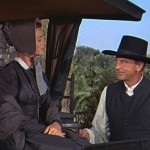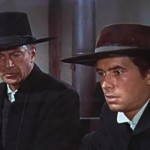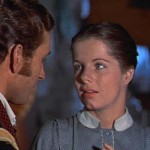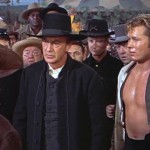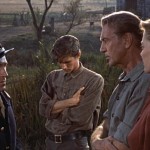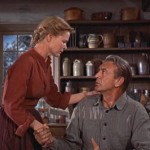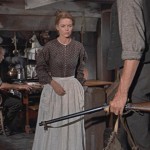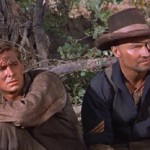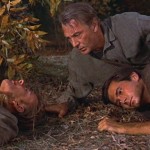
Friendly Persuasion – 1956
I’ve been having a difficult time deciding how to describe this film. On the one hand, it had a plot that was good in that it posed the audience with an interesting moral dilemma. If your religion is opposed any kind of violence, when does it become necessary to fight and kill? It is a theme that has been explored in many other films like Sergeant York… which also starred Gary Cooper. Hmmm…
On the other hand, much of the film was so sickeningly wholesome, I wanted to roll my eyes into the back of my head. Granted, the main characters were Quakers, which is a religion that believes in a very strict code of conduct, a code that, when followed, produces overly-wholesome people. Their polite and peaceful ways are how they live, and the film largely portrays an accurate depiction of Quakers in 1860. But to my modern sensibilities, I saw their behavior as unrealistic.
But here is the problem I am wrestling with, and it might not be a problem with the film or its characters. The challenge is to get past my own disbelief that there are people who would meekly allow their homes and families to pillaged and destroyed, saying that if bad men burn our farms to the ground, then we must simply accept it as God’s will. But I digress. I am here to give my thoughts on the merits of the film, not religions convictions of Quakers. That’s not to say that those convictions were not an element of the film. They most certainly were. In fact, I would venture to say that they were the central theme of the movie.
Gary Cooper plays Jess Birdwell, the patriarch of a Quaker family in Southern Indiana, during the American Civil War. His wife Eliza, played by Dorothy McGuire, is one of the parish ministers. They have three children: precocious “Little” Jess, played by Richard Eyer, Mattie, the religiously devout daughter who falls in love with a Union soldier, and the oldest son Josh, played by Anthony Perkins. Josh struggles with his desire to remain true to his Quaker beliefs and his desire to fight in the defense of his home and family.
The first three quarters of the film are devoted to showing two things. The first is the Quakers’ deep commitment to their religion and their peaceful way of life. They would rather die than resort to any kind of violence for any reason. The second, and more troubling, part of the movie shows how the strict behavioral code of the religion is oppressive and restrictive, even to those who follow it. I say disturbing, because each member of the Birdwell family goes out of his way, at one time or another, to stray from the code.
Then in the last quarter of the film, the stakes become higher as the Confederate soldiers arrive and Josh makes a conscious decision to fight and to kill, despite his mother and father’s protestations and pleas that he do no violence. Eliza says that if he chooses to fight with the Union militia, then he is not only rejecting his religion, he is rejecting her and her beliefs. Pretty strong stuff.
And though he fought and killed in defense of his home, in the end, it all worked out just fine. Nobody except one of Jess’s friends was killed. Mattie’s Union soldier boyfriend survived, and Josh was only wounded in the shoulder, though he had to live with the stain of killing on his conscious. Even that silly goose survived and became friends with Little Jess. OK, my eyes are rolling again. The ending would have been more poignant if either Josh or Gard Jordan, Mattie’s love interest, played by Peter Mark Richman, had died. The film really would have packed a punch if they had both died.
The acting was good, and I point to McGuire and Perkins, and stand-outs. I was a little annoyed with Little Jess, because he came dangerously close to breaking the cardinal rule of movie-making, which says that cute for the sake of cute is never cute… never. But they didn’t cross that line very often.
And just as an afterthought, the entire sequence with the Hudspeth family could have been completely removed from the film and nothing would have been lost. The three country-bumpkin girls were portrayed as a ridiculously man-hungry trio, like caricatures in a Tex Avery Cartoon. It was like desperate comic relief in a film that didn’t need any. Watch the movie and you’ll see what I mean.
